To All the Posts I Didn’t Write Last Year
If I could control space-time (a resolution for 2023 that’s about as likely as the others I’ve made), I would have put in an additional 10 hours of research and data entry into the Translation Database before posting this. But knowing that I’ll surely be crunched for time all this week, and next, and the week after, I figure it’s best to bring the data now—even if it’s incomplete.
For anyone new to this blog, welcome!, the Translation Database started in 2008 to track all books translated for the first time into English and sold reliably in the US. (In other words: No retranslations or reissues of books previous available in any English edition, and no UK-only titles that aren’t available via Ingram.) It started by tracking only fiction and poetry, but, with the move from being hosted here to over at Publishers Weekly, we added on categories for nonfiction and children’s books. (Note: Still NOT tracking drama and graphic novels for various reasons.)
Up until March 2020, the Database was extremely reliable. Then, when COVID disrupted things a bit (remember that?), a lot of pub dates got shifted, I stopped receiving sample copies from all the publishers (more on that below), everything got a bit stressful, and I’ve never quite caught up. I’ve been entering titles all the while—and updating records when I discover new pub dates—but I don’t feel like I’ve lived up to my own rigorous standards for completeness.
So, I’m turning to you for help. Attached below are spreadsheets detailing all the books in the Database, and then broken down by 2020-2023 (2023 being understandably sparse). If you are a publisher/translator/author/reader/data nerd/etc. and see or know of books that are missing, please add them via this form. (You can also make corrections there!) I’ll make this part of the updating process—reviewing all the submitted titles—the number one priority this week, so that, fingers crossed, at this time next month, I’ll be able to publish a post breaking down the data with confidence and charts and stats.
In the meantime, here’s where I am (these are all Excel files): Complete Database, 2020, 2021, 2022, and 2023.
Thanks in advance for your ongoing support with this project, which is going to take center stage here at Three Percent again this year . . . And now—on to the random, fun stuff!
*
Last year was probably the weakest in terms of Three Percent content. Sure, we did a few seasons of the Two Month Review Podcast (get ready for Season 19 by buying Rodrigo Fresán’s The Dreamed Part!), and I made waves with a post crapping on Alejandro Zambra’s work (he reached out afterward, things are now chill) and god knows what else. But that might actually have been it! Not like I didn’t have ideas or occasional desires to write—writing here truly kept me sane and happy for years, it’s a blast digging into books and numbers, publishing tales and wacky analyses, and just trying to crack everyone up—but time . . . definitely not on my side. (If you subscribe to the Mining the Dalkey Archive Substack, you’ll know why. And no, I didn’t really write consistently there, either.)
This year will be more productive—couldn’t get any worse!—and I want to start with a very classic sort of Three Percent post: Jamming together two fun things that have almost nothing to do with one another!
Below, you’ll find a bit of info on all the books that I’m using this spring in my World Literature & Translation class. (Which is my favorite thing. It’s more fun than editing, than drinking with booksellers at Winter Institute, than answering emails, mailing review copies, or any of the other titillating activities of being a small press, nonprofit publisher.) With literally one exception, I have read none of these books. It’s what makes this class so fun to teach—we’re all encountering these texts, published within the past year, for the first time and taking the temperature of the sub-genre of “translation” with little to no extant analysis for a majority of the books. It’s a fucking thrill topped off by my insisting that the class, as a whole, unanimously like in a court of law, choose a single book to win the class’s “Best Translated Book Award.”
At the same time, I’m opening up my “tickler file” of good (and terrible) article ideas, and going to burn off a bunch of these that I wished I had written last year. So, in the vein of Marcel Benabou’s Why I Have Not Written Any of My Books, let’s have some fun looking back at what could’ve been.
(Special Note: All books referenced in this post can be found on this list at Bookshop.org.)
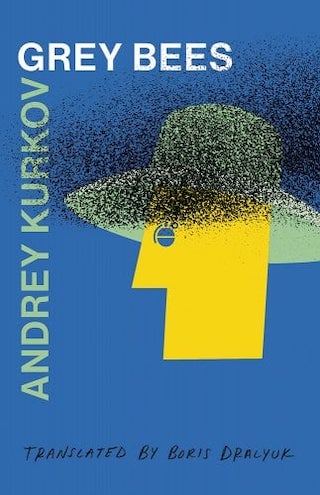
Grey Bees by Andrey Kurkov, translated from the Russian by Boris Dralyuk (Deep Vellum)
One of Ukraine’s most beloved authors, a book Deep Vellum struggled to keep in stock thanks to war and articles like this, this book was a no-brainer for my class. There are two things we can dive into before even considering the book itself: 1) Americans are so much more interested in foreign literature from countries (well, European ones at least) that are at war, and 2) I read Kurkov’s first book, Death of a Penguin, when Harvill Secker published it in the early 2000s and passed on it. I didn’t care for the translation—which would mix dollars, rubles, pounds on the same page—and thought both conceit and execution were twee. (Again, if you, for whatever strange reason, are reading your first Chad Post post, I’m admittedly horrible at diplomacy and mincing words. And if you hang on long enough, this post is 1000% guaranteed to jump the rails.)
Given the current situation, Boris Dralyuk’s involvement, the general love this book has received . . . 2023 is a good year for second chances?
Unwritten Post: The Continued Hiatus of the Best Translated Book Award
This would’ve been such a hand-wringing, self-involved article! The BTBA was my baby which, for years, was one of the biggest US-based awards for literature in translation. It gave out $20,000 a year in award money—to authors and translators, equally—it was open to all published translations, it didn’t have an entry fee, it was judged by readers and booksellers and authors and translators, it generated dozens of posts throughout the year, it highlighted no fewer than 35 titles in translation every iteration. But it was run on a shoestring and the semi-self-destructive will of a handful of individuals. There was no foundation really backing this; there was no support staff. Instead, for a pittance, 14 judges and a coordinator evaluated upward of 600 books a year, mostly in their “spare time.”
In 2020, we announced the last winner and decided to take a break. There were no books being mailed out, the world was teetering (although, let’s be honest: when is it not?), and getting people to willingly dedicate a year of their lives to reading books online? Well, that felt like a huge ask. Especially as the award money from the Amazon Literary Partnership program shrunk and I don’t know the US equivalent of the “Man Foundation.”
More importantly: What would set the BTBA apart from the National Book Award for Translated Literature, or the very well-heeled International Booker Prize? There’s so much overlap between the three, but those two are actual organizations, whereas BTBA ran on personal desire and volunteerism.
If we can find a rubric that would a) cut down on the number of eligible books, b) set us apart from NBA + Booker, and c) entice someone into funding this at $50,000 a year, we’re back in business. And I would like nothing more! I miss the excitement of this more than anyone realizes, but, echoing the core theme of this post: there’s only so much time, and only so much stress that any one person can endure.
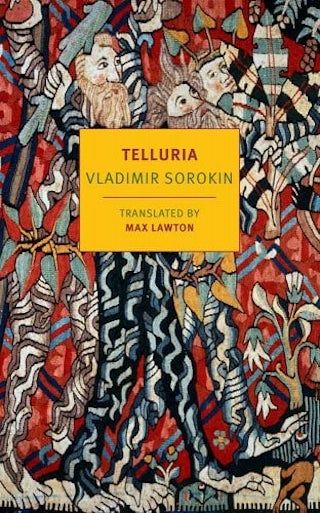
Telluria by Vladimir Sorokin, translated from the Russian by Max Lawton (NYRB)
Is two too many Russian books for my class? Probably. Although given the scope of the joint Deep Vellum and NYRB Sorokin project—something like eight books over four years—we might as well dive in. Sorokin is the most obviously Male Author on my syllabus. He’s also one of the most recognizable, well-known post-USSR, Russian authors. He’s got the Karl Ove Knausgaard hair, a reputation for rebellion, and seemingly no doubts whatsoever about his literary experiments. It’s something to behold. I really love The Queue, wrote my personal favorite review ever about The Ice Trilogy, respect Their Four Hearts, and enjoyed all the rest. I’ve read them all so far, so why not this one?
Unwritten Post: “The Big Dumper”
Every day during the baseball playoffs, I wanted to come up with a crazy scheme by which I could write a post just to talk about Major League Baseball nicknames, of which, “Dick Mountain” (Rich Hill), and “The Big Dumper” (Cal Raleigh) are my two personal favorites. I didn’t know of the “Big Dumper” until this year’s playoffs (only surprise is that it isn’t the Dodgers promoting something that’s just this side of obscene, I mean, they did this celebration.) Supposedly, “Big Dumper” is because Raleigh’s ability to “hit clutch home runs,” but also because of his shapely, spherical, “big butt” (jealous!). Sportscasting is already fraught with semi-lewd terminology “look at him penetrate!,” “with a slow release like that, it’s easy to jump on his balls,” and “Big Dumper”—which may as well be something my four-year-old would call himself—only adds to that tightrope. Love it. Baseball names—especially from the early 1900s—and weirdo ballplayer nicknames reign supreme, I think we NEED to adopt this for authors and translators. Level up, y’all! Rodrigo “The Graphomaniac” Fresán. Will “Willsconsin” Vanderhyden. Kaija “Hedgehog” Straumanis. And so on! Instead of advocating for your name to be on the cover, advocate for your moniker! If there’s one thing this field should embrace, it’s having fun just for the sake of fun.
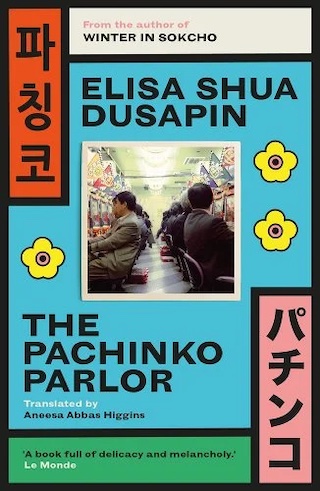
The Pachinko Parlor by Elisa Shua Dusapin, translated from the French by Aneesa Abbas Higgins (Open Letter)
Did you know that Elisa’s first Open Letter book, Winter in Sokcho, acquired mid-2020, won the 2021 National Book Award for Translation? Couldn’t have happened to a greater couple of artists. This follow-up?—the one book on this list I’ve already read?—is as good if not better. And will be interesting to (re)read for it’s brevity and sparse prose that contrasts with the (male) books above.
Unwritten Post: Akimbo Books
Given that part of this story happened this week, I suppose this entry is a clinamen in my Oulipian rubric. But even so, there should’ve been at least one post on here about Rachel Crawford opening Akimbo Books in downtown Rochester. Rachel is a former student, contributor to Three Percent (especially for the Women’s World Cup of Literature), and book lover who, last April, finally realized her dream of owning a brick-and-mortar bookstore/community space, giving downtown the indie bookstore presence it has needed for years. We could’ve—should’ve—interviewed Rachel, cross-promoted the store on our site, done more events, offered her an additional platform to promote her work and the books she selected for the store.
Unfortunately, this is all in the past tense because the building housing Akimbo Books caught fire last Wednesday and destroyed the entire store. It didn’t burn down, but everything inside was declared “unsalvageable” due to smoke damage. There’s a chance she might reopen, and she might be announcing a Go Fund Me in the future, but for now, if you want to help her out, you can order books (like all of the ones in this post!) via the store’s Bookshop website.
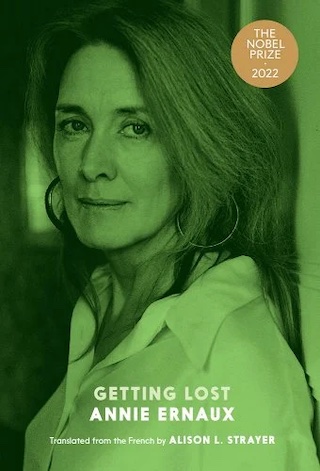
Getting Lost by Annie Ernaux, translated from the French by Alison L. Strayer (Seven Stories)
Getting Lost and Simple Passion, actually. And because these particular editions are designed with the Nobel in mind. Looking back at the paratextual elements of the past four decades of Ernaux’s books in English translation will definitely be interesting. There’s also, actually, a Dalkey Archive story to tease out of this . . .
Unwritten Post: The 2022 World Cup of Literature
Eight years ago. Eight! It was in 2014 that the Three Percent World Cup of Literature took place. An opportunity to use a silly rubric to highlight specific works from each of the 32 participating countries. Valeria Luiselli (representing Mexico) lost out to Roberto Bolaño (who “played” for Chile, but probably has more affinity with the Tiki-Taka of 2010 World Cup winners, Spain) in the finals, which, if I’m being real, would probably be reversed had Lost Children Archive gone up against The Spirit of Science Fiction instead of Faces in the Crowd against By Night in Chile.
Pitting art against other art as if it were a sporting event is obviously a bit foolish given the subjective nature of the process. (See the annual Tournament of Books.) It’s only slightly better than a listicle from an intellectual standpoint. And yet, and yet . . . it’s kind of fun? And more engaging than a traditional book review?
Obviously, we can run back the Women’s World Cup of Literature this summer, but why not come up with various other contests and competitions throughout the year. Put all the Japanese translations from 2022 in a bracket and have interesting readers sing their various praises before putting it all to a public vote. Have a “Copa America” for 2023 books from South America. Pit five-book squads from various presses against one another. I mean, I’m actively participating in Eating Well’s “Souper Bowl” and voting daily for my favorite recipes which is, well, kind of sad. (Although it has expanded my repertoire and man, I’m getting hungry . . .)
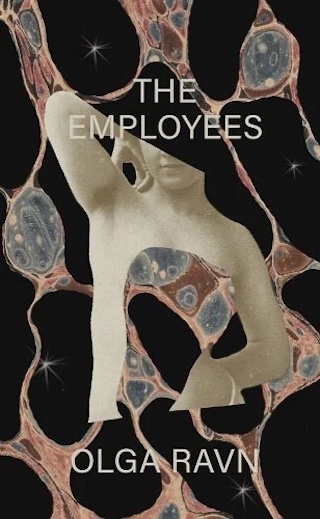
The Employees: A Workplace Novel of the 22nd Century by Olga Ravn, translated from the Danish by Martin Aitken (New Directions)
This is a book that I’ve been meaning to read all year, but never got around to. Martin “Scandinavian Slayer” Aitken is a brilliant translator—and great guy—and this was one of those titles that seemed destined to win an award. Science-fiction elements, relatively short, by a young author—this one might make me a hit with my students. (Having assigned Seiobo There Below by Krasznahorkai years ago, I’ve become very conscious of including a few slam dunk crowd-pleasers.)
Unwritten Post: Is Patreon Just OnlyFans for Podcasters?
Think about it!
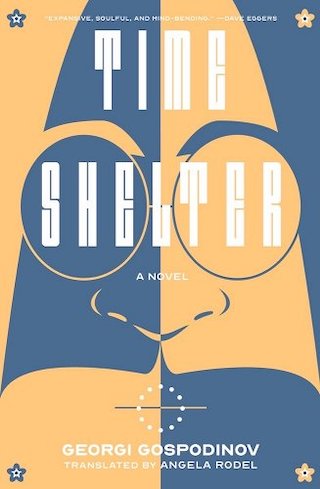
Time Shelter by Georgi Gospodinov, translated from the Bulgarian by Angela Rodel (Liveright)
Having worked on both Natural Novel and The Physics of Sorrow (the latter of which was one of the best TMR seasons to date), I was extremely disappointed to be outbid for this book. In the end, it’s all cool—I want my authors and translators to get paid—but I haven’t had the heart to read this in full . . . yet. (2023 is a good year for hatchet burying?) Angela Rodel is always a joy to talk with, and given the speculative, metaphorical nature of this book, it too could be a crowd pleaser.
Also: At the risk of catching shit from indie booksellers and everyone else (when am I not at risk?), you can get the Kindle version of this now for $2.99.
Unwritten Post: Favorite Books of 2022
So, I’m one of those people who keeps track of the books they read—I finished 84 last year—and usually love sifting through this list at the end of the year to write posts about “Funniest Books,” “Best Books by Women,” “Biggest Surprises,” etc., but of those 84 books, maybe a dozen weren’t work-related in one way or another. (And those dozen were all by Kate Atkinson and Sarah Moss.) I struggle to come up with ten translations from 2022 that didn’t come out from Open Letter or Dalkey.
Not to say that our books weren’t spectacular—I highly recommend The Endless Rose by Carlos Maleno and Wolfskin by Lara Moreno—but a post tooting only our horn would be sadder than checking Instagram every morning to see which soups advanced in the “Souper Bowl.”
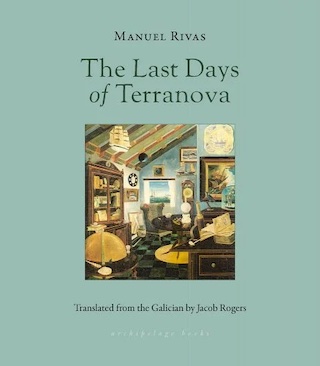
The Last Days of Terranova by Manuel Rivas, translated from the Galician by Jacob Rogers (Archipelago)
Rivas, probably the most well-known—and well-translated—of all Galician authors will be a good change of pace for my class. More classic and conventional than some of the others on the list. And besides, it’s a book about a bookstore and against greedy landlords—what could be better?
Unwritten Post: Spain As 2022 Guest of Honor at the Frankfurt Bookfair
I did write something for the Guadalajara Preview in Publishers Weekly about Spain and the potential impact of Frankfurt on translations from Spain, but given the number of Spanish books we’ve published over the past couple years—not to mention the ones coming up—and the fact that so so many of our authors were in Frankfurt to give presentations, participate on panels, etc., there was ample opportunity to flood the blog with posts about untranslated Spanish authors, various trends, the new issue of Granta on the various languages of Spain, and so much more.
I’ll make up for this a bit with a Mining the Dalkey Archive substack later this month (put Open Letter and Dalkey’s Spanish books together and woo-boy, we would CRUSH in the Publishers Cup of Spanish Translations), but so much more could have been done. Especially in relation to the business of publishing and the Translation Database.
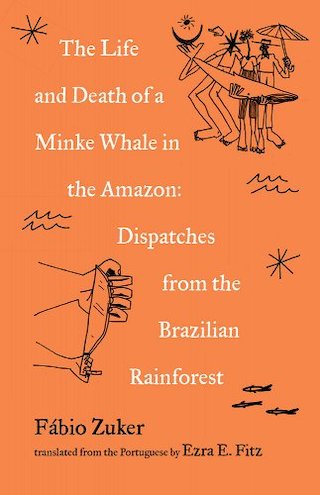 The Life and Death of a Minke Whale in the Amazon: Dispatches from the Brazilian Rainforest by Fábio Zuker, translated from the Portuguese by Ezra E. Fitz (Milkweed)
The Life and Death of a Minke Whale in the Amazon: Dispatches from the Brazilian Rainforest by Fábio Zuker, translated from the Portuguese by Ezra E. Fitz (Milkweed)
Aside from the fact that climate change is the most important topic of our time, I selected this book because Milkweed sent me three or four review copies and, as with everything else, I never did anything with them. In fact, I have no idea where they are!
But that’s a story in its own right . . . Last month, I went into the office and someone had cleaned and organized EVERYTHING, including all the boxes of backstock, of “to be reviewed” review copies, etc. Who did this? NO IDEA. But my copies of Life and Death of a Minke Whale is somewhere in the Tetris-esque wall of books that a kind soul put together.
I am a bit leery of figuring out who this is though, since they also have been using our mini fridge and left a bag of Chipotle chips in there. Which is weird—who refrigerates chips??—and horrifying, given Chipotle’s status as being responsible for 99% off the E. coli outbreaks of the past decade. (This fact is NOT verified! Just a joke! Don’t sue me, just stop making everyone ill!)
Unwritten Post: Where Is Our Mail?
Speaking of unsolved campus mysteries, around May 2022, we suddenly stopped receiving mail at our office. It had been relatively slow in comparison to the BTBA heyday and pre-COVID mailing levels, but after working remotely for a full month, I came back to . . . nothing. Not only that, but I received notices that boxes were waiting for me to pick them up, but when I got to the post office in the union, they claimed they had been delivered—but they weren’t. Caroline Casey tried valiantly to get us the Charco books for our TMR, sending them multiple times, but nada, zip, zilch, zero. We will get four to six issues of Publishers Weekly some days, and books from Feminist Press and Other Press seem to make it through, but that’s it. I’ve talked to half-dozen employees and still have no leads. So if you want to get me a book for review, hit me up and I’ll give you my home address.
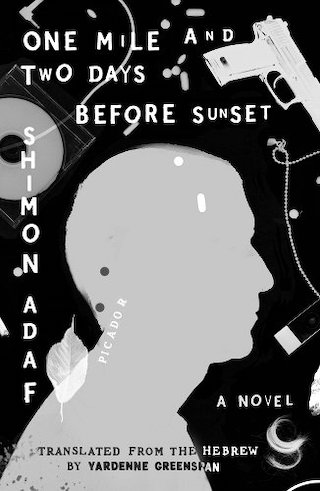
One Mile and Two Days Before Sunset by Shimon Adaf, translated from the Hebrew by Yardenne Greenspan (Picador)
I picked this book for my class purely on the strength of Rachel Cordasco’s piece about the whole “Lost Detective Trilogy” for World Literature Today. And I quote:
SHIMON ADAF’S Lost Detective Trilogy embodies many worlds, attitudes, genres, and voices. Like Walt Whitman and Bob Dylan, it contains multitudes. Philosophy, literary theory, immunology, temporal rifts, and religious texts mingle together in this trilogy to produce a work that attempts to mimic what Adaf believes is a deep truth: that people are not closed systems but nodes in a network of relationships. People are constantly exchanging bacteria and viruses with one another, their perceptions of time and space don’t line up, and one person’s individual trauma as a guinea pig in a concentration camp can be the portal to a major discovery about the nature of human consciousness.
Unwritten Post: Everything and Less
I referenced Mark McGurl’s Everything and Less: The Novel in the Age of Amazon on the last episode of the Three Percent Podcast. (Last . . . but not forever? Stay tuned!), but never got a chance to write about it. It’s filled with interesting ideas about the impact Amazon has on contemporary fiction writing. (He puts forth an argument that it’s more influential that the MFA mill.) There’s data, examples, deep dives into genres like Romance that I’m not already familiar with, etc.
One of the claims I found most intriguing—and which ties into this choice for my class—was about how the trilogy is the new standard of American writing. Seems a bit odd at first, but when you look into writing that isn’t “pure literature” it starts to really come into focus. Science-fiction trilogies were totally my jam as a kid. And every monster porn I’ve ever come across is at least a trilogy if not a full-blown series. (Looking at you, Cum for Bigfoot.)
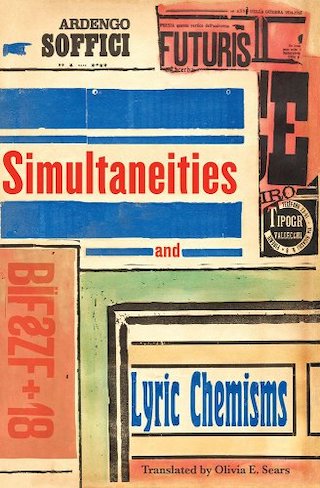
Simultaneities and Lyric Chemisms by Ardengo Soffici, translated from the Italian by Olivia E. Sears (World Poetry)
Although I’m mostly lost at sea when it comes to poetry, I feel obligated to include at least one poetry title in my class every year. If I’m being honest, I know close to nothing about this book except that a) I like the cover, b) Matvei Yankelevich is running World Poetry, and c) Olivia Sears (founder and board president of the Center for the Art of Translation) is fucking brilliant.
Unwritten Post: Penguin Random House Fails to Acquire Simon & Schuster
Given the extreme popularity of John “Don’t Call Me Mayer” Maher’s tweets about the DOJ vs. PRH court case, I’m glad I didn’t tread into these waters. But still . . . There were so many golden (by which I mean inane, insane, and rather stupid) quotes from various executives that would’ve been great fodder for Chad 1.0 (the mean-spirited version). This post has a lot of good shit in it—the Stephen King quote! comments on backlist! the belief that marketing is something only understood by Hogwarts graduates!—but here are a couple of John’s (since deleted) tweets.
DOJvPRH Day 3: Actual Jon Karp quote: “I’m not a game theorist, but….” Honestly, the man is hilarious. Asked if he has calculated Amazon’s market share: “I haven’t. I wish somebody would!” Govt isn’t taking the bait, but Karp is definitely pushing buttons.
— John Maher (@JohnHMaher) August 3, 2022
DOJvPRH Day 4: Sorry I’m taking so long, want to take just as diligent notes of the cross-exam. More ASAP. But here’s a fun tidbit in the interim. Dohle: “Everything is random in publishing. Success is random. Bestsellers are random. So that is why we are the Random House!”
— John Maher (@JohnHMaher) August 4, 2022
The first time I read that last one I groaned so hard I wished I could be a Big Dumper in the PRH lobby . . .
And with that filthy image, POST OUT! See you in a few weeks with overviews of some January titles and some other nonsense. In the meantime, tell everyone to input their titles into the Translation Database so that I can make statistics fun again.

Good to see you haven’t completely abandoned this. The international postal system has become a mess – I’ve had overseas booksellers reject orders because the courier company was refusing to deliver to NZ!